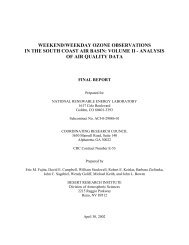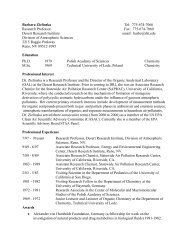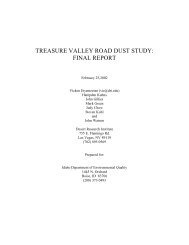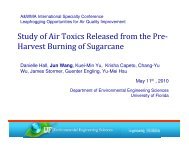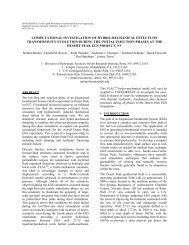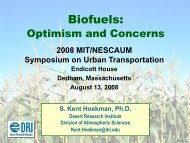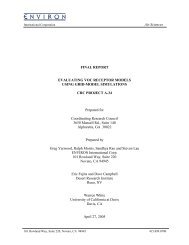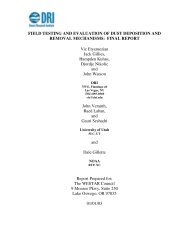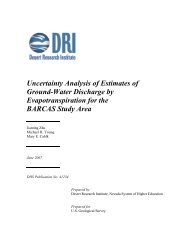Assessment of Conversion Technologies for Bioalcohol Fuel ...
Assessment of Conversion Technologies for Bioalcohol Fuel ...
Assessment of Conversion Technologies for Bioalcohol Fuel ...
You also want an ePaper? Increase the reach of your titles
YUMPU automatically turns print PDFs into web optimized ePapers that Google loves.
agasse, and hard wood chips. S<strong>of</strong>t wood is not considered compatible with the<br />
process. Feedstock with at least 60 percent carbohydrate content is said to be<br />
required <strong>for</strong> Iogen’s process.<br />
Iogen claims to have completed analyses <strong>of</strong> its process energy balance and <strong>of</strong> criteria<br />
that include air pollutant emissions, greenhouse gas emissions, and wastewater<br />
effluents and solid wastes; however the results are maintained as confidential<br />
in<strong>for</strong>mation. The company does indicate that ethanol produced by its process results in<br />
more than an 80 percent reduction in greenhouse gas emissions compared to<br />
gasoline. Production cost estimates and other economic analysis <strong>of</strong> Iogen’s<br />
technology is also confidential.<br />
Development Status–Iogen and its partners and sponsors have reportedly invested<br />
some $135 million in its biomass-to-ethanol process development to date, including<br />
about $18 million <strong>of</strong> Canadian Government funding. Following laboratory and benchscale<br />
testing, a one ton-per-day pilot plant was initially operated beginning in 1983.<br />
The current demonstration-scale (or “semi-works”) facility, which produced its first<br />
cellulosic ethanol in April 2004, was built at a reported cost <strong>of</strong> $45 million. This facility<br />
is capable <strong>of</strong> processing about 30 tons <strong>of</strong> dry wheat straw per day and producing<br />
about 2.5 million liters <strong>of</strong> ethanol per year (63 gallons/dry ton). The Canadian<br />
Government announced in February 2007 that it would contribute an additional $7.7<br />
million toward a $25.8 million project to upgrade this facility.<br />
Future Development Plans–Iogen and its partners have been exploring potential<br />
plans in a number <strong>of</strong> Canadian provinces, U.S. states and other countries <strong>for</strong> a<br />
commercial-scale (or “commercial prototype”) biomass-to-ethanol facility employing its<br />
process. Factors considered in site selection include: availability and cost <strong>of</strong><br />
feedstock; quality <strong>of</strong> existing local infrastructure; magnitude and timeframe <strong>of</strong><br />
government policy commitment; and ability to conclude all necessary commercial<br />
agreements. Based on these factors, the company has announced a narrowing <strong>of</strong><br />
locations <strong>for</strong> this first project to include North Central Saskatchewan, East Central<br />
Alberta, Eastern Germany and Southeast Idaho.<br />
Following the 2007 U.S. DOE grant award, the Idaho project now appears to have the<br />
best prospects, although funding plans <strong>for</strong> this facility are apparently still to be<br />
finalized. Total cost to configure and construct the plant and associated facilities is<br />
said to be up to $350 million (U.S.). This facility, planned <strong>for</strong> a site at Shelley, Idaho,<br />
would process 700 dry tons per day <strong>of</strong> agricultural residues–said to include wheat<br />
straw, barley straw, corn stover, switchgrass and rice straw -- producing about 18<br />
million gallons <strong>of</strong> ethanol per year (71 gallons/dry ton). Final announcement <strong>of</strong> the<br />
project and initiation <strong>of</strong> construction is expected be<strong>for</strong>e the end <strong>of</strong> 2007.<br />
100



